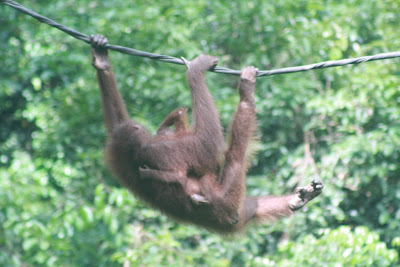This chap was harvesting the fruit of the palm oil tree. Our guide suggested that Him Outdoors have a go as it's not as easy as it looks, apparently. I don't actually think it looks that easy to wave around a wobbly pole
with a very sharp lnife at the end of it.
Before you criticise the palm oil industry think about this - the industry provides biofuel, which is supposedly a 'green alternative' to fossil fuels and is Borneo's primary source of income. While many hectares are covered in palm plantations, there are effective sanctuaries and the government has pledged to preserve the rainforest as the natural habitat of several species - tourism is the second or third contributor to Borneo's economy.
From the money earned through the sale of palm oil, Malaysia can next year offer free primary education to all children for the first time ever, and greater health care. I'm not saying I'm all for it; I'm just saying it's not as simple a situation as it might at first appear. Yes, we all want to save the monkeys, but isn't a government's duty to look after it's people by providing the basic necessities of life through economic stability?
And wouldn't telling Borneo they can't farm palm oil because it is destroying the rainforest, be like telling New Zealand they can't graze sheep and cows because they have cut down their native beech forests to provide pasture? Pot, kettle, anyone?
We took a trip along the Kinabatangan River (the second longest in Borneo - missing out by about three kilometres to the Rajang River) at dusk to see the local wildlife. Others spotted a snake swimming through the water by the boat, but I fortunately missed that experience.
 |
| A monitor lizard attempts to blend into a tree - quite successfully actually |
 |
| These macaques are curious creatures and come to check us out as we cruise by |
 |
| A troop of proboscis monkeys - my nephew Aidan says they are his favourite animals. |
 |
| This one shows off his 'red hot chilli pepper', according to our guide |
 |
| I think this one looks like Him Outdoors |
A boat trip down the river, past a couple of little fishing villages, and out to sea and Libaran Island.
It's not just a resort, but also a working village and a base for the military. Boats patrol these waters and you can see the islands of the Philippines less than 200 yards away. As we travelled out to snorkel on a reef, I asked why there were so many military boats. The guide answered because they have had problems with pirates kidnapping tourists, and then took off on the boat, leaving us stranded on the island. I didn't know which to worry about first - sharks, jellyfish, seasnakes or pirates!
When we got back to 'our' island, our guide had changed into military fatigues and took us on a walk around the village - it was blisteringly hot and, sensibly enough, there was barely a soul to be seen. We felt very mad dog indeed!
There are videos to explain the process of rehabilitation and the habits of these amazing creatures. Their genetic make-up is 96.4% the same as that of humans, which may help to explain why we find them so fascinating - and why they find us just a little curious.
When the pig-tailed macaques turned up, the orangutans took off back to the trees and climbing ropes - they move slowly and gracefully in comparison with the fleet macaques. A couple walked along beside us, checking us out. Due to predators, wild orangutans spend most of their time high in the trees, but since the extinction of the Borneo tiger, they have learned to come down to the forest floor to forage for fruit, and now spend about 5% of their time down here.
Meanwhile the orangutans showed off their acrobatic skills.They're particularly good at the asymmetric bars.

























































Kate, you are a brilliant photographer and I thoroughly enjoyed this journey of Borneo through your stunning pictures! xx
ReplyDeleteThank you! We probably wouldn't have gone to Borneo if it weren't for the fact that my brother lives there, but I'm so glad we did. It's a great holiday destination and I thoroughly recommend it.
ReplyDeleteCheers
Kate